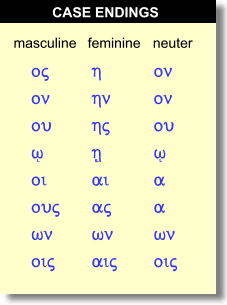The word case comes from the Latin "casus," which means falling. Its use for a grammatical category of nouns (and noun-like things) stems from the idea that a noun (person, place, thing, idea, etc.) falls into a particular role in a sentence, and receives its meaning from the role it plays.
In English, we generally determine the role of a word in a sentence by its actual position. We can distinguish the difference between the sentences "The boy hit the ball" and "The ball hit the boy" by the position or place of the words "boy" and "ball." The first position is the subject; the second position is the object. But Greek and Latin allow for a much more flexible order of words within a sentence. It is therefore necessary for these languages to indicate by means other than the order of words in a sentence the place each noun is to occupy. Greek and Latin do this by attaching a suffix to each noun (and noun-like thing).
There are five cases in Greek:
- nominative
- vocative (rare, and usually the same form as the nominative)
- accusative
- genitive
- dative
![]()
Consider case endings as visible flags pointing to the function of a noun
(or pronoun or participle) in a sentence. To illustrate, imagine that English
adds to each noun, pronoun, or adjective the letter 'n' for subject (nominative
case), 'a' for direct object (accusative case), 'd' for indirect object (dative
case), and 'g' for possession (genitive case).
- Then mann
bit thea doga.
The man bit the dog. - Thea mana
bit then dogn.
The dog bit the man. - Then mann
gave thed dogd thea bonea.
The man gave the bone to the dog. - Then mann
has thea bonea theg dogg.
The man has the bone of the dog (the dog's bone).
In this 'new' English, dog could be spelled in four ways:
- dogn when used as the subject
- doga when used as the object
- dogd when used as the indirect object.
- dogg when used to show possession.
In real English, dog can be spelled in two ways:
- dog - when used as subject, direct object, indirect object or possessive (when used with the preposition 'of').
- dog's - when used as the possessive.
But note that in English even possession is often indicated without a change in the spelling of the word:
- of a dog = dog's
![]()
The English pronoun best reflects the concept of case endings. Notice how
many ways we naturally express forms of the pronoun in English. Greek does
that not only with pronouns, but with all noun-like things: nouns, adjectives,
articles, participles, and pronouns.
- First person singular: I, me, my, mine
- First person plural: we, us, our, ours
- Second person singular: you, your, yours
- Second person plural: you, your, yours
- Third person singular: he, him, his, she, her, hers, it, its
- Third person plural: they, them, their, theirs
NOTE: The case endings below show the most common.




